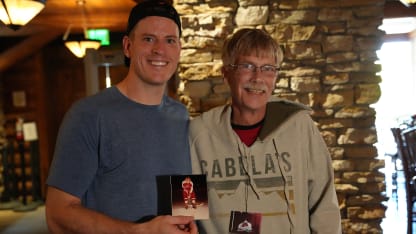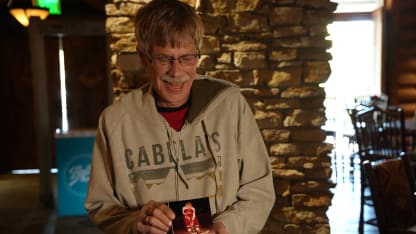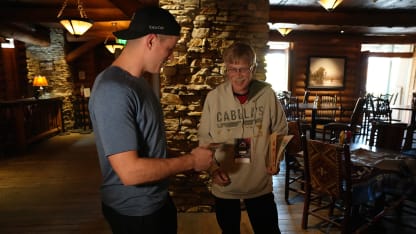Despite being a lifelong Avs fan, he had never been to a game prior to this past Saturday night on Nov. 12. When asked about what it meant to him to be a part of the Avs' Hockey Fights Cancer night, Murphy said, "It means growing up in Duluth, Minnesota to going out there and standing with the Avs at a professional game. Now to be nominated from the cancer center to represent all those good people and how great they've been to me starting with my heart through cancer, I can't tell you how much I really appreciate being here."
Murphy's journey to simply being at Ball Arena is nothing short of incredible.
"UCHealth is not only where I discovered the leukemia I had, but how I started with UCHealth," Murphy said. "I got Life Flighted out of Scott's Bluff because of my heart. When they got me down to the hospital there, I had two arteries turn to solid bone. They put me in a coma for 10 days and I kept having heart attack after heart attack when they tried to do bypasses. Finally, Dr. Stroud went to Jackie and said if we leave him in the coma he's going to die. [Doctor Stroud said], 'I can try to drill one out, but he has a 12-13% chance of living and to get blood flowing. We can do bypasses six weeks later.' As you can see, it worked. They couldn't treat me for the leukemia until I had the five bypasses. So, they just monitored me for that for six or nine months."
The type of leukemia that Murphy has is chronic lymphoctic, which means that his bone marrow produces too many lymphocytes, a type of a white blood cell. The liver and/or spleen can also become too large to perform their functions in the body. Instead of accepting his diagnosis, or becoming discouraged, thanks to the staff at UCHealth, his determination and fighting spirit, Murphy is on his way to remission.
Murphy finished recounting his journey so far with cancer by adding, "They could treat me for my leukemia then (six years ago) and six years ago they said it was uncurable, they would maintain. Now, I'm on a protocol that come August or September after two years I'll be in total remission. My bloodwork right now is all normal besides a cancer marker, but (six to seven years ago) they said it wasn't possible."
Now, MacDonald and Murphy's friendship is new - about a month old - but their bond has grown quickly.
"I didn't even realize he was from Cornell," Murphy said with a smile on his face. "I had brought a picture of me in my old hockey gear, and he said when he was there, so now I've been following him since then."





